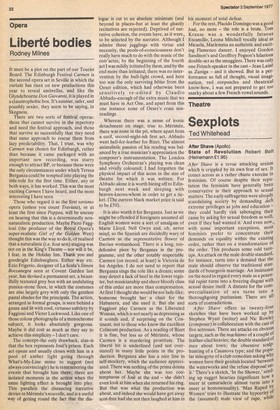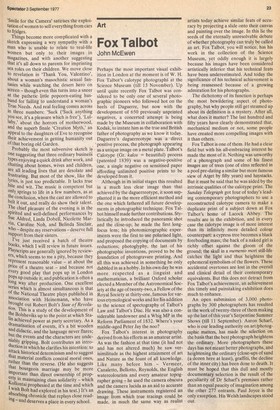Theatre
Sexplots
Ted Whitehead After Shave (Apollo) State of Revolution Robert Bolt (Heinemann V .95) After Shave is a revue attacking sexism which is crippled by its own fear of sex. It comes across as a rather chaste exercise in feminism. Of course despite their reputation the feminists have generally been conservative in their approach to sexual matters. The early suffragettes were already scandalising society by demanding ,ii`ich extreme privileges as jobs and education — they could hardly risk sabotaging their cause by asking for sexual freedom as well, even if they had wanted it. And even now,, with some important exceptions, most feminists prefer to concentrate their demands on equality within the existing order, rather than on a transformation of the order. This produces some odd turn ups. An attack on the male double standard, for instance, turns into a demand that the male should observe the traditional standards of bourgeois marriage. An insistence on the need to regard every male as a potential rapist turns into a freezing disgust with sexual desire itself. A distaste for the coinmercialisation of sex turns into a thoroughgoing puritanism. There are all' sorts of contradictions.
After Shave offers us twenty-four sketches that have been worked up by Stephen Wyatt (writer) and Nic Rowley (composer) in collaboration with the cast of five actresses. There are attacks on obvious targets, such as the machismo of a couple of leather-clad heavies; the double standard of men about town; the obsessive scalphunting of a Casanova type; and the popular misogyny of a club comedian asking NOY women have their genitals located 'between the waterworks and the refuse disposal unit.' There's a sketch, 'In the Shower,' sending up rugger hearties (significant how sneer at camaraderie almost turns into a sneer at homosexuality). 'Man Raped bY, Women' tries to illustrate the hypocrisy 01 the (assumed) male view of rape, while 'Smile for the Camera' satirises the exploitation of women to sell everything from cars to fridges.
Things become more complicated with a sketch expressing a wry sympathy with a man who is unable to relate to real-life Women but only to their images in magazines, and with another suggesting that it's all down to parents for imprinting sex roles on their children. We move close to revelation in `Thank You, Valentino', about a woman's masochistic sexual fantasies while watching the desert hero on screen — though even this turns into a sneer at the pathetic little popcorn-eating husband for failing to understand a woman's True Needs. And real feeling comes across in three numbers: 'Suck ('Suck anything You see, it's a pleasure which is free'), 'Lullaby,' about the horrors of motherwood, and the superb finale 'Creation Myth,' an appeal to the daughters of Eve to recognise their achievement in getting humanity out of that boring old Garden. Probably the most subversive sketch is; one suggesting that three ordinary businegi' types enjoying a quick drink after work, and chatting about homes, wives and children, are all leading lives that are desolate and frustrating. But most of the show, like the lyrics, is just too predictable. It lacks true bite and wit. The music is competent but only springs to life in a few numbers, as at the conclusion, when the cast are allowed to belt it out, and really do show their talent. The chief pleasure of the evening is in the Spirited and well-defined performances by Sue Aldred, Linda bobell, Nicolette Marvin, Caroline Noh, and Belinda Sinclair, Who — despite my reservations deserve full support from their sisters.
I've just received a batch of theatre books, which I will review in future issues. PlaYseripts are generally ignored by reviewers, which seems to me a pity, because they represent reasonable value — at about the price of a theatre seat — and because not every good play that pops up in London Pops up outside it; and publication is often a long way after production. One excellent series which is almost simultaneous is that of the National Theatre plays published in association with Heinemann, who have brought out Robert Bolt's State of Revolution. This is a study of the development of the Bolsheviks up to the point at which Stalin achieved power aS party secretary. As a dramatisation of events, it's a bit wooden and didactic, and the language never flares; but the events and the characters are undeniably gripping. Bolt contributes an introduction in which he clarifies his intention: to attack historical determinism and to suggest that material conflicts conceal moral ones, rather than the reverse. (He also suggests that bourgeois marriage may be more Important than direct ownership of property in maintaining class solidarity — which Kollontai prophesied at the time and which I wish Bolt had explored in his text.) It's an absorbing chronicle that replays close reading and deserves a place in every school.































 Previous page
Previous page